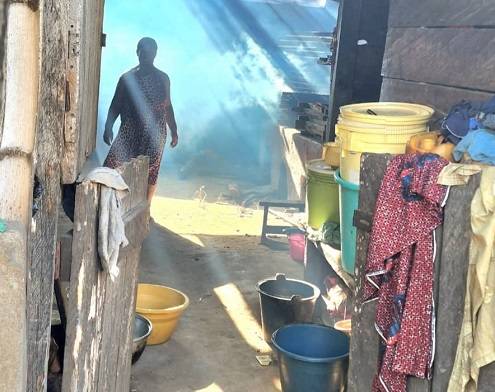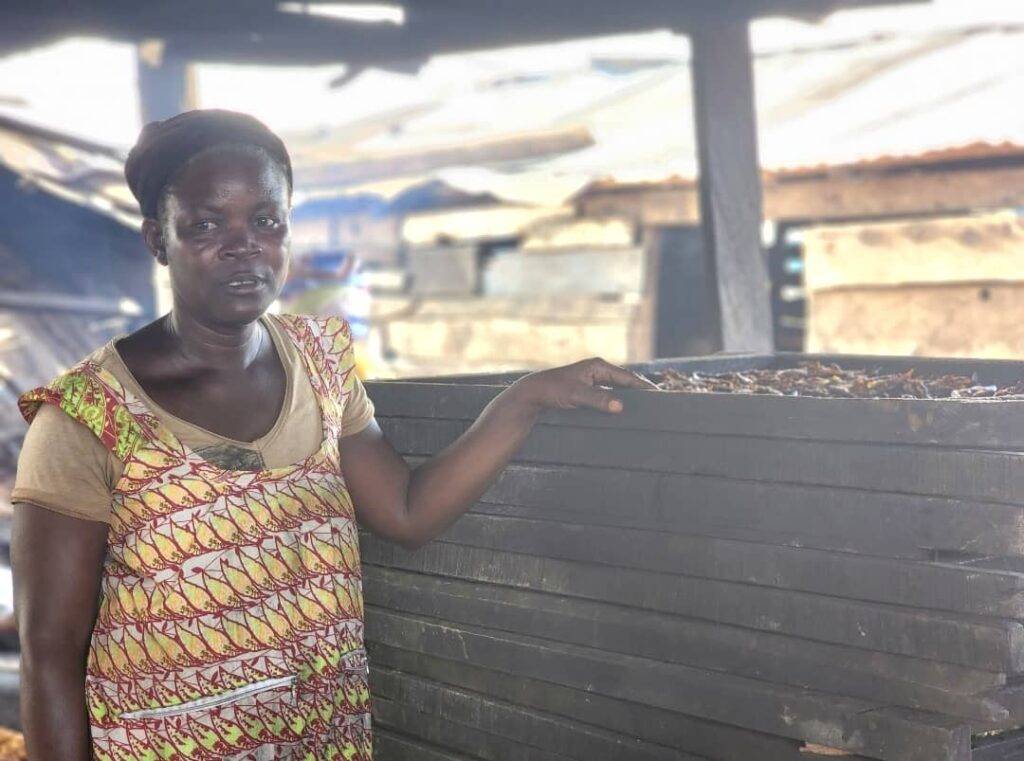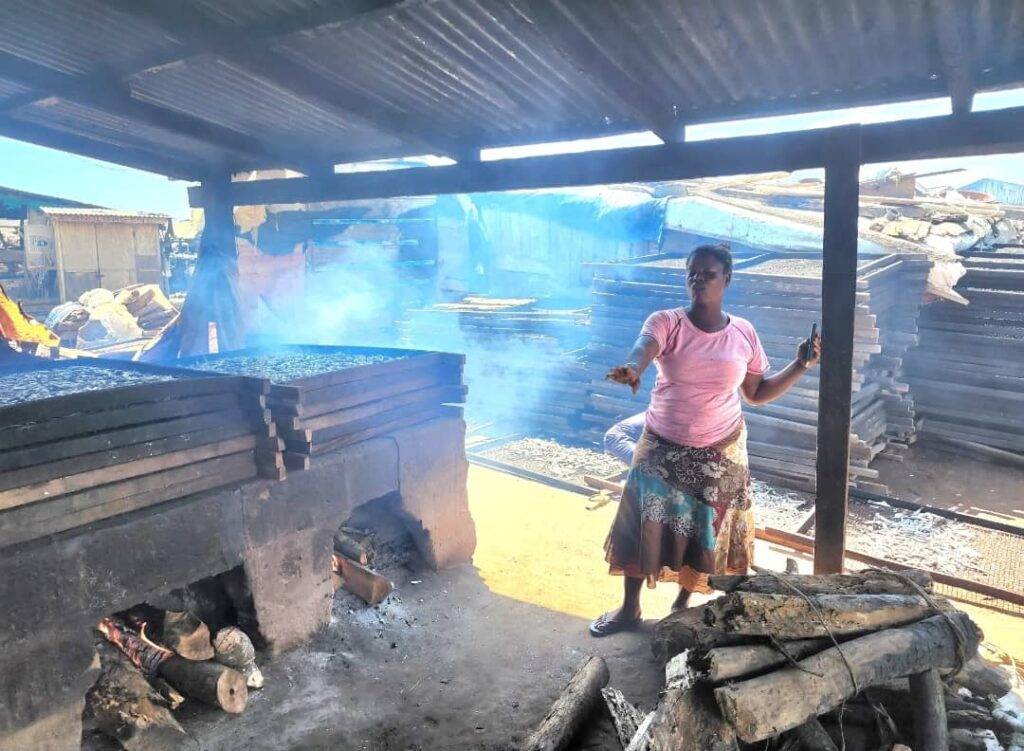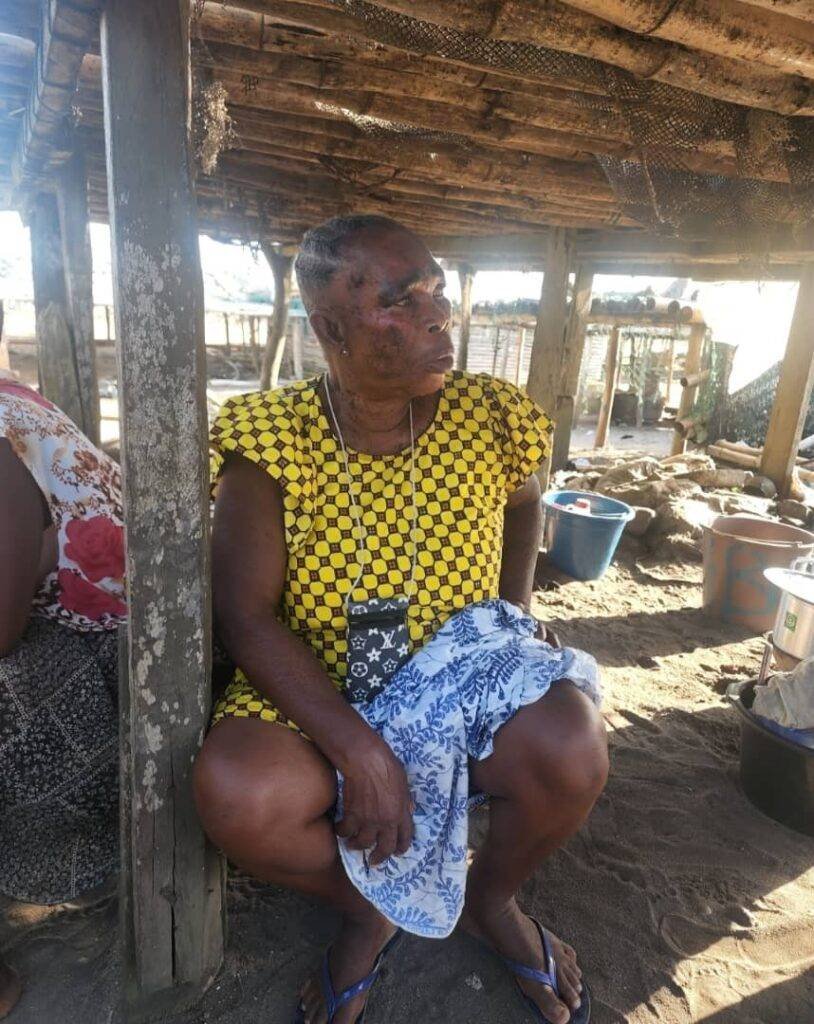
Elmina, Central Region – Esi Ashun knew a time would surely come that she would have severe vision problems. She had seen it happen to her mother, who is now bedridden and blind, and her late neighbour. Both women had made their livings from fish smoking here on Ghana’s coast.

But Esi didn’t expect to lose her sight so soon. About eighteen months ago the 44-year-old started experiencing pain and blurred vision in both eyes. She used an ointment to alleviate the symptoms but they only got worse.
“I woke up one day and decided it was time to go to the hospital before I end up completely blind like my sick mother who lost her sight four years ago,” says Esi, taking a break from sorting fish in a large basket nearby, “I went to the Elmina Polyclinic to get my eyes checked but I was diagnosed with severe dry eye syndrome and pterygium which the doctors said could get worst with continuous exposure to smoke. I was advised to choose my sight over proceeds from the fish smoking business.”
Pterygium is a fleshy overgrowth that spreads over the eyeball. Esi says the diagnosis saddened her but stopping the fish smoking business was not an option. She has two sons to support until they graduate from Senior High School. Fish smoking is her only means of making an income to support them all.
Esi sits inside her wooden enclosed hut engulfed in smoke emanating from an old fashioned oven made with clay, which she uses to smoke fish for sale. For as many as seven hours a day she moves fish over a grate covering smoldering wood coals. With the hut is filled with smoke. Esi coughs slightly now and then. Two other women share the space with Esi and help with the sorting of fresh fish.

Esi and her mother are some of many women in the fishing industry who are losing their sight because of the hours they spend over coals smoking.
fish to feed Ghanaians. Many are being sickened in other ways. Health experts say the biggest threat comes from microscopic particles in the smoke which can get into the eyes and cause burning and other eye diseases which can lead to blindness, without medical intervention. Blindness is just one of the many illnesses faced by fisherwomen. They also face respiratory illnesses, heart conditions and infertility. Young children exposed to the smoke are also vulnerable to a range of illnesses. The World Health Organisation says 28,000 Ghanaians die prematurely each year as a result of air pollution. That number is expected to rise.
Most of the women with eye problems end up at the Christian Eye Center in Cape Coast where ophthalmologist Dr Hope Paa Kwesi Fynn treats them. Esi’s ailment is typical of what he sees. He says prolonged exposure to smoke can cause various eye diseases including recurrent inflamed pterygium, cataracts, and other corneal conditions which, when not properly managed, can cause irreversible blindness.
Too often, he says, women are rushed to the clinic once their problems are severe. “Many times they arrive late when the cornea has already been badly damaged, and nothing can be done about it,” Dr Fynn says.
He says there is the need for serious eye care education in Elmina and all other coastal communities to increase awareness about the hazardous nature of prolonged exposure to smoke.
Esi followed the sad path that Dr Fynn warned about. She didn’t return to the clinic after the diagnosis. Instead she relied on over-the-counter medications to reduce the symptoms.
That choice cost her dearly. Esi has lost vision in her right eye. Her left eye is now blurry too. Esi struggles to even prepare the fresh fish for smoking due to her poor sight. But she is hanging on with smoking hoping to make it through one more year when her sons graduate.
“I barely have a good sleep at night these days, my eyes are always itchy and red,” Esi says. “I feel serious burning sensations, especially at night. I was told without treatment the severe dry eye could affect my cornea and cause some complications.”
Esi says the ophthalmologist she used to take her mother to at the Cape Coast Teaching Hospital told them her mother’s blindness could be closely linked to her prolonged exposure to wood smoke.
Esi’s blindness has impacted the whole family. Her siblings have relocated their mother to Winneba for care because Esi is also struggling to care for herself. Esi believes strongly in the herbal ointment she applies on her eyes hoping one day it will cure her blind right eye and reverse the blurry vision in the left one.
But Dr Fynn warns such ointments – widely used among fishmongers in Elmina – are doing nothing helpful and could be making things worse. When women rub their eyes the smoke particles trapped there can scratch the cornea leading to complications that can cause blindness. Pollutants can cause cornea ulcers which are difficult to treat and exacerbate pre-existing conditions such as dry eye or conjunctivitis.
“The cornea is very sensitive yet many of these women engaged in this hazardous method of fish smoking are not aware,” Dr Fynn says. “Even when they are told, some do not believe until it is too late.”
Dr Fynn urges the women to have frequent eye screenings for early detection of abnormalities, saying preventative care is always better than curative. He advised them to use eye shields and masks to reduce the amount of smoke that gets in the eyes.
Abena Nyamekye, another fishmonger here has been in the business for close to two decades. She says waking with blurred vision has become normal for her. Sometimes it gets so bad she requires assistance to cross the street.
“It sometimes lasts for days,” says Abena. “It got to a point where I stayed indoors for four days with swollen eyes. I managed the condition with some eye drops I got from the drug store at the market and an ointment plus some pain killers to manage the headache that came with the eye irritation.”

Unlike Esi, Abena took the health experts’ advice, she now sells salted dried fish, popularly known as “momoni” which does not involve firewood. She was able to start the new trade with support from family members.
Esi on the other hand says she does not have enough time to start a new business which would probably not earn her as much as she earned smoking fish for sale. “There is no time to test the waters because I have to provide for my sons in school. They will graduate next year so hopefully after their graduation I will give another business a try and I hope my conditon will not get worst,” she says.
Researchers also say that age-related cataracts – a major cause of blindness in people over 50 – can be associated with environmental risk factors, including chronic exposure to wood smoke.
Dr Antwi-Boasiako Amoah, Director of Climate Vulnerabilities and Adaptation at the Environmental Protection Agency (EPA), says the EPA is very concerned about the health impacts it is seeing but it currently lacks adequate funding to support the massive awareness creation activities that are needed to educate fishmongers about the dangers of air pollution.
But for most of these women relinquishing the fish smoking trade that threatens their sight will not be an option as long as they have no other means of a livelihood. They are sending a message to leaders that the awareness campaign must be accompanied by support to move into alternative livelihoods or they will continue to have no choice but to risk their health.
BY RAISSA SAMBOU
**********
This story was in collaboration with New Narratives. Funding was provided by the Clean Air Fund. The funder had no say in the content of the story.


